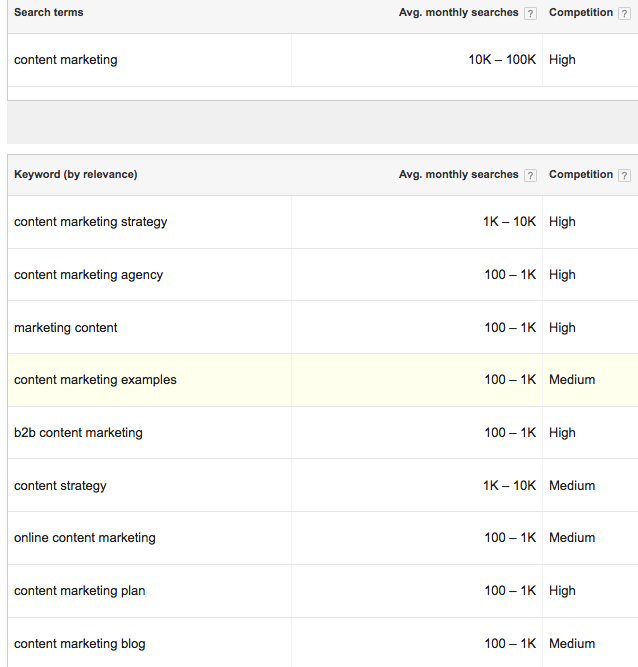If you are a content marketer, you probably already use Google tools to simplify your life.
Regardless of your past results, you should always be looking for new ways to improve performance – maybe these 5 free tools from Google can help.
Social media, the right keyword tool, Google Keyword Planner, honing a search term can all have a huge impact on your volume and your success in content marketing.
Many people view Google as a search engine. Although it’s fine to want your website to appear at the top of search engine giant Google’s results pages, you must not ignore the process that will get you there.
Content marketing success is partly about the tools and strategies you use.
This post could change the way you approach content marketing, regardless of how experienced you are.
1. Google AdWords Keyword Planner
Are you looking for a tool to help you target the most relevant keywords for your business?
There are many options, but the Google Keyword Planner is still one of the very the best ways to do keyword research.
This free tool is easy to use and has many great features.
Content marketers should search for keywords that will give their website or blog post a boost.
The more searches you do, the better you will understand the tool’s capabilities. Multiple searches will give you a better idea about which keywords are most relevant to your site.
If “Content marketing” is your primary keyword, you would rank at the top of Google for this term in a perfect world.
But you also know that this is difficult. You also know that long-tail keywords can improve your search results.
This tool will help you find these terms. For example:

Now you have a better idea about what to do next. Perhaps you discover that the keyword “b2b Content Marketing” makes sense for a blog post.
To get more long-tail ideas, you can simply plug that term in as your primary keyword.
Although Google Keyword Planner may seem to be a simple tool, it is powerful for content marketers who want keywords that will improve their bottom line.
2. Google Analytics
What goals have you set for your content-marketing strategy?
If you don’t know how to answer this question, it’s time to take a step back to reevaluate your situation.
If you have already set goals, chances are that many of them are based upon search engine results and related statistics. You should be familiar with the inner workings and functions of Google Analytics.
This tool will give you an instant snapshot of how you performed over a specific period of time. This will give you an idea of your progress towards achieving your goals. You can then dig deeper to find more data.
It gives me a clear picture of what’s working and not, in terms of topic selection, the content I’m publishing, as well as whether readers are interested in what I have to offer. Google Analytics is a great tool to help you find and focus your attention on the data that has the greatest impact on your site.
3. Google Search Console
Similar to Google Analytics in many ways, the time you spend using this free tool is rarely wasted.
The Google Search Console has so many things to offer, you could spend hours combing through data.
This tool can be used to do more than just check your site’s health.
Search Analytics, for example, allows you to quickly analyze the performance of Google Search terms.
To find out more about how keywords perform, click the Position box. This will display the average position of all keywords in Google Search.
Content marketers need to be familiar with all the features of Google Search Console. Even if you only use it for a few key metrics it is well worth it over the long term.
4. Google Trends
Do you struggle to find new ideas for your blog or other content marketing opportunities?
The keyword planner of search engine giant Google provides hundreds keywords that are related to your industry and business. However, this is not always enough when it comes to creating compelling and useful content. In other words, Another way to do keyword research is needed.
This is why I make it my habit to check Google Trends whenever I’m trying to come up with new blog ideas.
This tool allows you to explore any topic and see what’s hot. You can also view “stories that are trending now” to see if anything matches your industry or the approach you prefer.
This tool is easy to use and doesn’t require any prior knowledge. Just type in your topic, and Google will give you results.
5. Google Alerts
Google Alerts is a tool that allows you to monitor the web for brand mentions and interesting new content. Google will then send you an email once per day or once per week depending on your preference, with a notification if your selected keywords are mentioned in new listings.
Google Alerts one way to stay up-to-date on news and new content.
As a content marketer, I recommend setting up alerts for:
- Your brand name
- Your personal name
- Key terms in the industry and
- Major competitors
These alerts will allow you to quickly spot new trends and may even provide you with great content for your social media channels.
Conclusion
Only 42 percent B2B marketers claim to have a sophisticated content strategy, so it’s obvious that there’s always room to improve, from keyword search that can increase your search volume, to using long tail keywords in your blog posts.
While some of these free tools from Google will be more powerful for you than others, each one is worth getting to know in the long-run.




